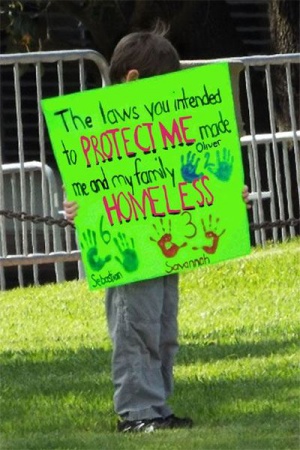Movement to reform sex offender laws in the United States

Movement to reform sex offender laws in the United States is a growing[1][2][3] nationwide movement that works towards reforms in sex offender registries in the United States. The movement consist of more than 50 state level organizations, at least one in each state.[4][1][5] The cause of the movement is supported by researchers and some child safety advocates, such as Patty Wetterling,[6][7][8] and organizations like Human Right Watch[2][9][10] and ACLU.[5]
Arguments

The participants in the movement argue that indiscriminate placement of offenders in the sex offender registry may undermine their ability to rehabilitate because of the social stigma and other hardship related to sex offender registration.[5] They assert that sex offender registries are overly broad as they reach to non-violent offenses, such as sexting or consensual teen sex and target people who are not sexual predators but who have rather made a mistake, and keep unfairly punishing the offender even decades after serving their sentences.[8][12][13][14][15]
They say that registries should be available for law enforcement only and that officials should be more judicious in deciding who poses a risk instead of the current policies applied to all offenders indiscriminately, as every case and defendant’s story is different.[16][5] The movement points to lack of evidence to support effectiveness of sex offender registries or residency restrictions, and notes that collateral consequences of sex offender registration, such as social stigma, unemployment, homelessness and vigilante attacks extend also to the families of registrants.[17][18]
Activism
Movements activism consist of peaceful demonstrations, challenging the laws in courts and educating the public and legislators about facts of sexual offending and the consequences of current legislation.[19][20][21] Reform Sex Offender Laws, Inc. (RSOL) arranges yearly national conferences to discus sex offender legislation.[14][22][23] Their state affiliates have challenged ordinances governing registered sex offenders in federal court.[24][25][26] During 2014 over 20 municipalities in California were sued by RSOL.[27] Their efforts in California culminated, in March 2015, when Supreme Court of California declared residency restrictions unconstitutional citing their unfairness and counterproductive effects.[28]
In April 2015 Women Against Registry announced that it has begun gathering information and participants for two class action lawsuits to be filed in United States federal court. One of the law suits is intended to be on behalf of registered sex offenders, and the second on behalf of families of registered sex offenders.[29][20]
See also
- California Reform Sex Offender Laws Organization
- Sex offender registry
- The Center for Sexual Justice
- SOR problems
- Criminalisation of youth
- Reform Sex Offender Laws, Inc.
- Arkansas Time After Time
- USA FAIR, Inc.
- Illinois Voices for Reform
- Michigan Citizens for Justice
- Women Against Registry - W.A.R
References
- ↑ 1.0 1.1 "High School Sweethearts -- Or Sex Offenders?", The Huffington Post, 25 July 2011.
- ↑ 2.0 2.1 "Laws Gone Wild: As Teen Sweethearts Go to Prison for Sex, Mothers Rebel", The Daily Beast, 25 January 2012.
- ↑ "Sex-offender laws are ineffective and unfair, critics say", Al Jazeera America, 17 October 2014.
- ↑ "Teen Has Sex With Girl, 14, Gets Punishment on 'Steroids'", Newser, 5 July 2015.
- ↑ 5.0 5.1 5.2 5.3 "Campaign for Elkhart 19-year-old underscores broader concerns about sex offender registries", The Elkhart Truth, 9 June 2015.
- ↑ "Patty Wetterling questions sex offender laws".
- ↑ "The Accidental Sex Offender", Marie Claire, 28 July 2011.
- ↑ 8.0 8.1 "My Son, the Sex Offender: One Mother's Mission to Fight the Law", NBC, 8 May 2014.
- ↑ "No Easy Answers: Sex Offender Laws in the US", Human Rights Watch, 11 September 2007. Retrieved on 2011-02-21.
- ↑ Raised on the Registry: The Irreparable Harm of Placing Children on Sex Offender Registries in the US (2012) Human Rights Watch ISBN 978-1-62313-0084
- ↑ "Advocates Fight for Sex Offender Rights With Lawsuit", Broward Palm Beach New Times, 17 April 2015.
- ↑ "Teenager’s Jailing Brings a Call to Fix Sex Offender Registries", The New York Times, 4 July 2015.
- ↑ "The Today Show Weighs In on Our "Accidental Sex Offender" Story", Marie Claire. Retrieved on 5 January 2016.
- ↑ 14.0 14.1 "National conference aims to soften, reform sex offender laws", KOAT Albuquerque, 29 August 2012.
- ↑ "No Justice: Sex Offenses, No Matter How Minor or Understandable, Can Ruin You for Life", AlterNet, 23 July 2013.
- ↑ "Women seek to dissolve sex offender registry", News-Press Now, 2 May 2015.
- ↑ "Collateral damage: Harsh sex offender laws may put whole families at risk", AlJazeera America, 27 August 2015.
- ↑ "Missouri Sex Offenders: "Women Against Registry" Says Labels Unfairly Destroy Lives", Riverfront Times, 5 September 2015.
- ↑ "Convicted sex offenders seeking more rights in Carson", Daily Breeze, 25 July 2015.
- ↑ 20.0 20.1 "Advocates Fight for Sex Offender Rights With Lawsuit", Broward Palm Beach New Times, 17 April 2015.
- ↑ "Florida group sues Seminole County, sheriff over sex-offender rules", Orlando Sentinel, 29 September 2015.
- ↑ "We can do better on sex offender laws", The Dallas Morning News, 16 July 2014.
- ↑ "Restricted Group Speaks Up, Saying Sex Crime Measures Go Too Far", The New York Times, 1 October 2013.
- ↑ "We can do better on sex offender laws", The Dallas Morning News, 17 July 2014. Retrieved on 14 November 2014.
- ↑ "CA RSOL Challenges El Dorado County Sex Offender Ordinance", In Eldorado County News, 21 July 2013. Retrieved on 14 November 2014.
- ↑ "Attorney files sex offender lawsuit against Lompoc", Lompoc Record, April 24, 2014. Retrieved on 14 November 2014.
- ↑ "County sued over sex offender ordinance", Daily Press, Oct 21, 2014. Retrieved on 14 November 2014.
- ↑ "Housing Restrictions For Sex Offenders Unconstitutional, California Court Rules", The Huffington Post.
- ↑ "Women seek to dissolve sex offender registry", News-PressNow, 17 May 2015.
